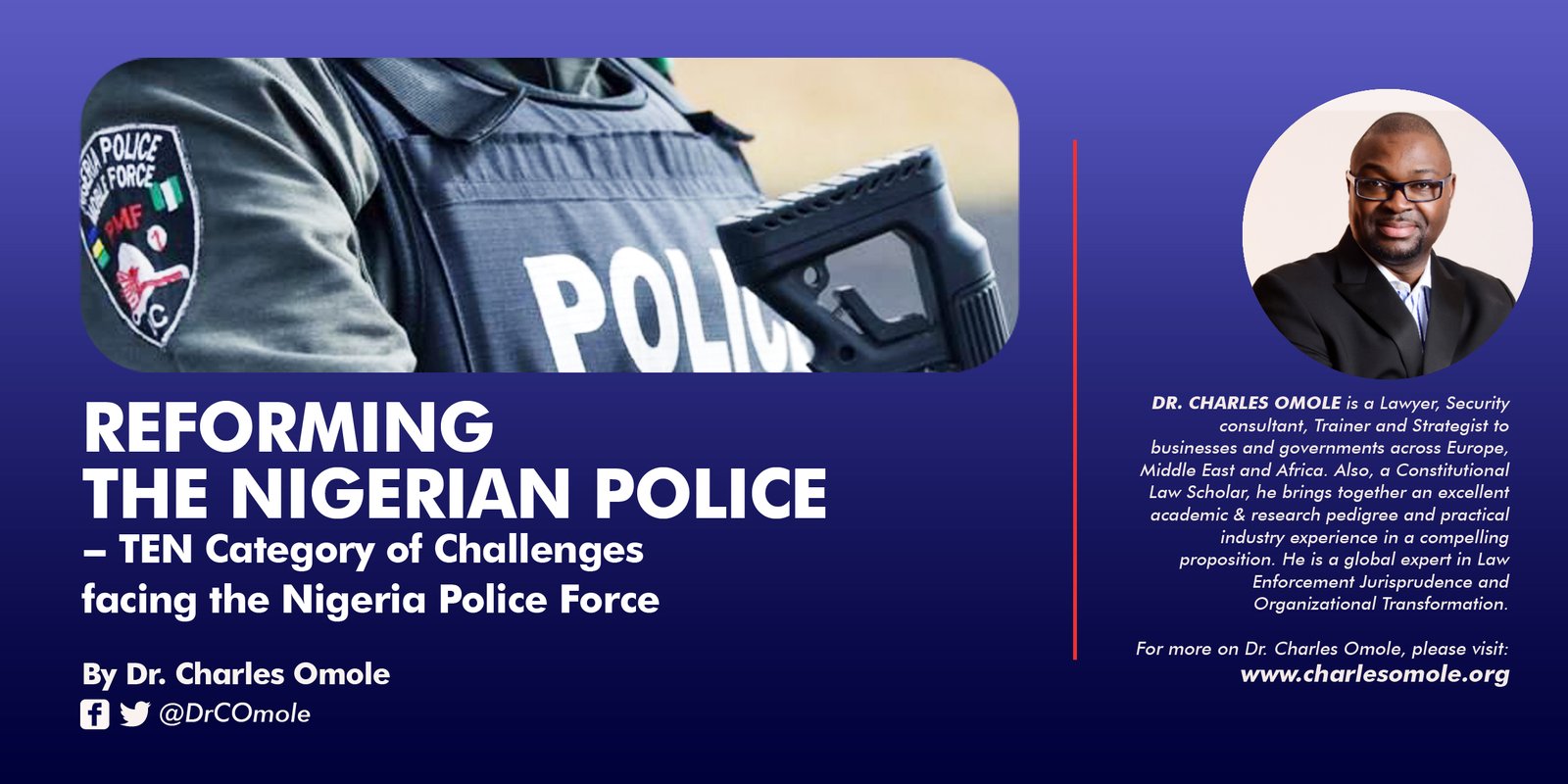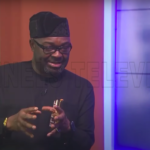REFORMING THE NIGERIAN POLICE – TEN Category of Challenges facing the Nigeria Police Force

For many years I have researched policing in Nigeria and Africa at large. I have also written extensively on these issues. It is clear to me that Nigerians do not fully appreciate the depth and scale of the challenges facing the police. It is easier to be critical of them, but they have not been set up to succeed but rather to fail. The constraints faced by the police are so enormous that effective policing is almost impossible unless there are changes. These constraints have metastasised into many misconduct and unprofessional behaviour by many police officers.
Despite attempts by the police institution to discipline and even sack officers that are reported (more of that has been happening lately), there is a never-ending pipeline of officers who perpetuate similar misbehaviour that replaces the sacked ones.
From recruitment, to training, to internal management, there are many challenges facing the Nigerian police. And until these challenges are addressed, any attempt to reform he police will be like sticking plaster over a crack instead of fixing it. So, What are these Challenges?
HISTORICAL CHALLENGES – The way the Police has been emasculated historically by the military has stunted their capacity to be citizen-focused or respond to effectively manage crime and criminality. The historical baggage the police carry, has stripped them of the principle of “Policing by Consent” which is essential for public buy-in into police operations. Historical underfunding and neglect has caused a lot of damage.
INSTITUTIONAL CHALLENGES – Corporate culture and internal discipline. No independent complaints system. The PSC has no independent capacity to investigate or police the police. Complaints against NPF officers to PSC end up being investigated by the NPF itself (though a party to the complaint), who then reports to PSC. This is unsatisfactory. No ratings or independent Inspectorate regime that will rate police Commands or measure their effectiveness.
STRUCTURAL CHALLENGES – The way the police are organised does not promote community policing effectiveness. CPs take instructions from IGP instead of Governors. The over-centralised structure of the police does not help it to connect with communities as it should.
LEGAL/ESTABLISHMENT CHALLENGES – The legal framework of NPF need to be changed to provide security of tenure for IGP. S215(3) of the Constitution states that: “The President or such other Minister of the Government of the Federation as he may authorise in that behalf may give to the Inspector-General of Police such lawful directions with respect to the maintenance and securing of public safety and public order as he may consider necessary, and the Inspector-General of Police shall comply with those direction or cause them to be compiled with.” But what can the IGP do if the President gives him an order that is unlawful. Absolutely NOTHING. In fact the constitution in S215(5) states: “The question whether any, and if so what, directions have been given under this section shall not be inquired into in any court.” So; the IGP cannot seek judicial review of an unlawful order by the President. This by implication means the IGP has to obey ALL orders given by the President; whether lawful or not. These Legal constraints make manipulation of the police by any President very easy. The President can easily remove any IGP that does not play ball. That is why we have had about 13 IGPs in 15years.
OPERATIONAL CHALLENGES – Lack of adequate equipment and tools. Up to 40% of officers on personal guard duties. NPF does not have sufficient frontline officers because lots of them are on private security duties with VIPs and anyone that can afford to pay for their services. This creates operational difficulties for the core policing functions as there is scarcity of officers.
FINANCIAL CHALLENGES – not enough is being spent. We now have Policing by donating and corporate goodwill in Nigeria. Basic infrastructure and equipment does not exist in many police locations. For instance; as of today; fingerprint searches in the Police is done via manual paper searches in filling cabinets. There is no computerised system at the central registry in Lagos. It is all manual searches done on paper with hand-held magnifying glass. Most officers buy their own uniforms and allowances are paid very late if at all. These avoidable difficulties promotes subsistence corruption throughout the police estate.
ENVIRONMENTAL CHALLENGES – Wider Criminal Justice slowness & poor public recognition. The wider criminal justice system is so badly managed that police officers have also become part of the problem. Proliferation of security outfits in Nigeria have also diluted the role of the police so much that people often get confused as to who to report certain crimes to. These disparate security agencies compete instead of cooperate. For example, all private security firms in Nigeria are licenced by the Civil Defence Corps and not the NPF and Billions are collected annually from these firms as registration fee by Civil Defence. Civil defence focuses on protecting its bread and butter first rather than share these information with the police in an automatic fashion. So how can the police be effective when facing these environmental challenges.
CAPACITY CHALLENGES – Ongoing Training and validation not widespread. Inadequate recruitment and initial training. The recruitment process into the police is so ineffective that it will be a miracle if we get any good officers in the future. Garbage in, is garbage out. You can finish a prison term for armed robbery in Aba today and join the police in Lagos tomorrow. As long as you do not declare your conviction; there is no way the police will know. NPF recruits contain all manner of criminals and criminally insane individuals that the training regime that could have weeded them out has also been compromised. Heads of police training colleges have tales of “Instruction from above” commanding that ALL recruits-in-training must be passed, even though more than half failed the course or examination. This ensure poor quality on-boarding of officers which inevitably leads to poor officers on the job.
LEADERSHIP CHALLENGES – Too many IGPs in succession. Hence lack of continuity and strategic focus. Too many tactical responses and little strategic focus. The lack of security of tenure due to the legal challenges of the way the police is setup noted earlier leads to a revolving door of IGPs in succession. So IGPs are not in post long enough to make strategic plan and impact. In fact those that spend more than a year as IGP lived in fear that they could be sacked at any moment that they fail to make any long-term strategic plans. Giving certainty of tenure to IGPs will make them more effective and more independent of politicians.
POLITICAL CHALLENGES – Too much political interference in policing in Nigeria. This demotivates good officers as political patronage becomes a basis for promotion and benefits. This political interference has also decimated the ranks of Specialist Officers in the NPF; who are often requested to become ADCs etc by Governors (against NPF rules). Once the police losses such officers to politicians; they usually never come back to their hands-on specialist posts afterwards.
As can be seen from these Ten Challenges; simply recruiting more officers will not solve the problems. In fact, the current approach is merely re-enforcing mediocrity. Changing and transforming policing in Nigeria, require that attention is paid to all these challenges for the benefit of the nation.




Comments
I thank God for your life, and for the knowledge I and many others learn from your posts every now and then.
I sincerely hope that one day, those saddled with the responsibilities of leading us in Nigeria will summon the courage to do what is right and just, in making the various ministries and the lives of those they govern better and productive.
Thank you sir.